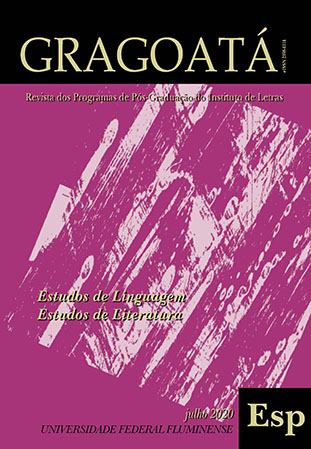Mimimi de mulher em ‘memes’: referenciação, estereotipagem e reenunciação
DOI:
https://doi.org/10.22409/gragoata.v25iEsp.34198Palavras-chave:
Referenciação, reenunciação, estereótipo, contrato comunicativo, meme.Resumo
Os posts (publicações) trocados em rede digital demonstram uma multi-interação e projetam uma profícua partilha de informações, opiniões, novos gêneros discursivos e protocolos de comunicação. É esse o caso do meme, um gênero digital emergente, que ganha rapidamente força expressiva e capacidade comunicacional. Justamente pelo seu caráter “replicante”, ao repetir, total ou parcialmente, o dito e/ou o dizer para expressar algo novo e deixar impresso em sua superfície seu caráter imitativo-transformador, representa, de modo explícito, o dialogismo que perpassa todo enunciado. A partir da configuração de memes caracterizados como “mimimi”, isto é, de conteúdo insistentemente questionador, mais especificamente aqueles que focalizam a representação da mulher, pretende-se analisar como é fabricado um estereótipo, pressupondo-se haver representações sociais inicialmente prototípicas com potencial para serem alçadas a generalizações. Destaca-se nessa análise a reenunciação de fórmulas fixas, tão comumente empregada em memes, em um visível processo de intertextualidade/intericonicidade partilhado, sobretudo, ou especificamente, pelos internautas, como fator de reorganização avaliativa de certas representações sociais. A partir de um conjunto de memes criados em torno da máxima “bela, recatada e do lar”, utilizada, inicialmente, pela revista Veja, em abril de 2016, na descrição de Marcela Temer, “primeira-dama”, este trabalho pretende analisar o processo verbo-visual de referenciação nesses enunciados, marcadamente estereotipado, como recurso comunicativo e axiológico relacionado à feminilidade. A base teórica para a análise estará centrada na Teoria Semiolinguística de Análise do Discurso, na interface com a Linguística Textual, com a Teoria das Representações Sociais, com a Semiologia e com aporte relacionado à reenunciação.
Downloads
Downloads
Publicado
Edição
Seção
Licença
AUTORIZAÇÃO
Autores que publicam em Gragoatá concordam com os seguintes termos:
Os autores mantêm os direitos e cedem à revista o direito à primeira publicação, simultaneamente submetido a uma licença Creative Commons Atribuição 4.0 Internacional (CC BY 4.0), que permite o compartilhamento por terceiros com a devida menção ao autor e à primeira publicação pela Gragoatá.
Os autores podem entrar em acordos contratuais adicionais e separados para a distribuição não exclusiva da versão publicada da obra (por exemplo, postá-la em um repositório institucional ou publicá-la em um livro), com o reconhecimento de sua publicação inicial na Gragoatá.
A Gragoatá utiliza uma Licença Creative Commons - Atribuição CC BY 4.0 Internacional.











